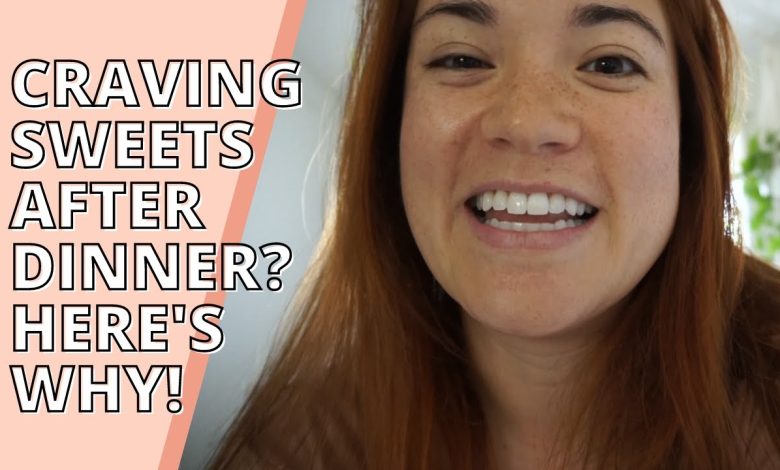8 Reasons You Crave a Sweet Treat After Dinner

Do you ever finish dinner, sit back feeling full, and then suddenly find yourself wanting a piece of chocolate, ice cream, or cookies? If yes, you’re not alone. Millions of people experience post-dinner sweet cravings, even when they aren’t really hungry.
But why does this happen? Is it just a bad habit—or is your body trying to tell you something deeper?
The 8 main reasons you crave sweets after dinner, backed by nutrition insights. Plus, we’ll share practical tips to manage and overcome these cravings without depriving yourself.
Why Understanding Sweet Cravings Matters
Cravings aren’t always about willpower. Often, they are a signal from your body or brain. By uncovering the root causes, you can:
- Improve digestion.
- Balance blood sugar.
- Boost energy levels.
- Support weight management.
- Build a healthier relationship with food.
Now, let’s break down the 8 reasons you crave sweet treats after dinner.
1. Blood Sugar Imbalance
After dinner, especially if your meal is high in refined carbs or low in protein, your blood sugar levels may spike and then drop quickly. This rollercoaster effect triggers your brain to seek a quick energy source—most often, sugary foods.
Signs this may be your reason:
- Feeling sluggish after meals.
- Craving sweets specifically, not savory foods.
- Energy “crash” about 1–2 hours after eating.
How to fix it:
- Include lean protein (chicken, fish, beans) in dinner.
- Add fiber-rich carbs (brown rice, quinoa, sweet potatoes).
- Pair carbs with healthy fats (avocado, olive oil, nuts).
2. Habitual Eating
Sometimes, it’s not hunger—it’s routine. Many people grew up having dessert after dinner, making it a psychological cue. Even if your body doesn’t need extra fuel, your brain associates the end of dinner with sweets.
Signs this may be your reason:
- You want dessert even when you feel full.
- Cravings happen at the same time daily.
- You reach for sweets mindlessly.
How to fix it:
- Replace dessert with a healthy ritual like herbal tea, a short walk, or fruit with yogurt.
- Slowly reduce portion sizes of dessert instead of cutting it out instantly.
- Practice mindful eating—ask yourself, “Am I truly hungry, or just following routine?”
3. Emotional Eating
Stress, boredom, or even happiness can drive sweet cravings. Sugar activates the brain’s reward center, releasing dopamine, which creates temporary comfort.
Signs this may be your reason:
- Cravings strike on stressful or lonely nights.
- You eat sweets to “treat yourself” or relieve emotions.
- Cravings feel urgent, not casual.
How to fix it:
- Try stress-relieving alternatives like journaling, stretching, or deep breathing.
- Keep healthier sweet options handy (dark chocolate, dates, smoothies).
- Seek balance—don’t shame yourself for enjoying a treat, but avoid using it as your only coping mechanism.
4. Not Eating Enough During the Day
If you restrict calories or skip meals earlier in the day, your body may overcompensate at night, leaving you craving sweets. This is your body’s way of demanding quick energy to make up for what it missed.
Signs this may be your reason:
- Skipped breakfast or had very light meals.
- Feeling ravenous by dinner.
- Overeating sweets late at night.
How to fix it:
- Eat balanced meals throughout the day (protein + fiber + healthy fats).
- Never skip breakfast—opt for eggs, oats, or Greek yogurt.
- Carry healthy snacks like nuts, fruit, or boiled eggs to avoid extreme hunger later.
5. Lack of Sleep
Poor sleep increases levels of ghrelin (hunger hormone) and decreases leptin (satiety hormone). As a result, you crave high-energy foods—like sugar—for a quick boost.
Signs this may be your reason:
- Sleeping less than 7 hours consistently.
- Cravings are stronger on nights after poor sleep.
- You feel tired even after dinner.
How to fix it:
- Aim for 7–9 hours of quality sleep.
- Avoid caffeine late in the day.
- Create a bedtime routine (dim lights, no screens before bed).
6. Gut Microbiome Influence
Your gut bacteria play a huge role in cravings. Certain microbes feed on sugar, and when your gut is out of balance, it can send signals that make you crave sweets.
Signs this may be your reason:
- Frequent bloating or digestive issues.
- Regular sugar cravings, not just after dinner.
- Diet lacking in fiber and fermented foods.
How to fix it:
- Add probiotic-rich foods like yogurt, kefir, kimchi, or sauerkraut.
- Increase fiber intake (fruits, veggies, whole grains).
- Limit processed foods that feed bad bacteria.
7. Low Serotonin Levels
Serotonin is the “feel-good” hormone, and carbohydrates (especially sugary ones) help increase its production. If serotonin is low, you may crave sweets at night as a quick mood booster.
Signs this may be your reason:
- Feeling anxious, moody, or low in the evening.
- Cravings for sweets feel emotionally comforting.
- Less interest in protein-rich foods.
How to fix it:
- Eat complex carbs like oats, brown rice, and quinoa instead of refined sugar.
- Engage in activities that naturally boost serotonin—exercise, meditation, sunlight exposure.
- Consider magnesium-rich foods (dark chocolate, nuts, leafy greens) which support serotonin.
8. Dehydration or Thirst Confusion
Sometimes, your body confuses thirst with hunger. If you’re slightly dehydrated after dinner, you may misinterpret the signal as a craving for sweets.
Signs this may be your reason:
- Cravings feel mild, not urgent.
- You realize you haven’t had much water all day.
- Drinking water sometimes reduces the craving.
How to fix it:
- Drink a glass of water before reaching for dessert.
- Keep a water bottle nearby during dinner and afterward.
- Include hydrating foods like cucumbers, oranges, or watermelon in meals.
Quick Strategies to Beat Sweet Cravings
Even if you know the reason, cravings won’t disappear overnight. Here are some simple ways to manage them:
- Plan Smart Desserts – Instead of cutting out sweets completely, choose healthier alternatives like fruit salads, dark chocolate, or homemade protein balls.
- Balance Every Dinner – Ensure your plate has protein, fiber, and healthy fats to keep blood sugar steady.
- Distract Your Brain – Go for a 10-minute walk, read, or stretch to shift focus from food.
- Mindful Eating – If you do have dessert, enjoy it slowly. Savor every bite instead of mindlessly eating.
- Set Boundaries – Keep processed sweets out of your kitchen, but allow room for moderation when dining out.
Conclusion
Craving a sweet treat after dinner is incredibly common, but it’s not always about weakness or lack of willpower. It can be linked to blood sugar imbalances, habits, emotions, sleep patterns, gut health, or even dehydration.
By identifying which of the 8 reasons applies most to you, you can take small but powerful steps to regain control of cravings. And remember—having a sweet treat occasionally is not a failure. The goal is balance, not perfection.
So the next time you find yourself eyeing that dessert after dinner, ask yourself: Am I truly hungry—or is my body or mind asking for something else?
With awareness, smarter food choices, and a balanced approach, you can enjoy sweetness in your life without letting cravings control you.




